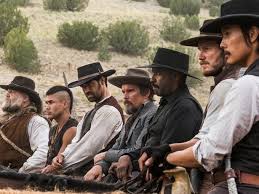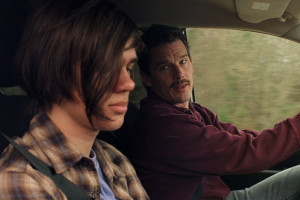IT’S A DISASTER: Movie Reviews of The Magnificent Seven and Deepwater Horizon by Howard Casner
Posted: October 4, 2016 | Author: Donald | Filed under: Uncategorized | Tags: Akira Kurosawa, Antoine Fuqua, Battle Beyond The Stars, Byung-hun Lee, Chris Pratt, Colby Parker, Deepwater Horizon, Ethan Hawke, Gabriel Fleming, John Malcovich, Jr., Kurt Russell, Manuel Garcia-Rulfo, Mark Wahlberg, Martin Sensmeier, Matthew Michael Carnahan, Matthew Sand, Nic Pizzolatto, Peter Berg, Peter Sarsgaard, Richard Wenk, Steve Jablonsky, The Magnificent Seven, The Seven Samurai, Vincent D’Onofrio, Washington | 9 Comments »For questions: hcasner@aol.com
First, a word from our sponsors: I wanted to say thank you to everyone who contributed to our Indiegogo campaign for 15 Conversations in 10 Minutes. We did very well due to you folks. For those who weren’t able to give, keep us in your thoughts. And if you are able to contribute in the future, contact me and I’ll tell you how. I will even honor the perks on the original campaign.
I am now offering a new consultation service: so much emphasis has been given lately to the importance of the opening of your screenplay, I now offer coverage for the first twenty pages at the cost of $20.00. For those who don’t want to have full coverage on their screenplay at this time, but want to know how well their script is working with the opening pages, this is perfect for you. I’ll help you not lose the reader on page one.
Ever wonder what a reader for a contest or agency thinks when he reads your screenplay? FosCheck out my new e-book published on Amazon: Rantings and Ravings of a Screenplay Reader, including my series of essays, What I Learned Reading for Contests This Year, and my film reviews of 2013. Only $2.99. http://ow.ly/xN31r
and check out my Script Consultation Services: http://ow.ly/HPxKE
Warning: SPOILERS
 Two films have opened as of late which have disaster in common. One falls into that genre and one almost is one.
Two films have opened as of late which have disaster in common. One falls into that genre and one almost is one.
There is one transcendent moment in the most recent version of The Magnificent Seven. It comes at the end as the credits begin by showing each of the characters. At this point, behind them, one can here the incredibly epic score by Elmer Bernstein from the 1960 version. It’s stirring, splendid, glorious, stunning…
Unfortunately, this tiny fraction of the movie only really ended up serving one purpose: it clearly reminded the audience of the earlier version, and not to the benefit of the present one, and only went to show how bland and uninteresting the music is when it comes to James Horner and Simon Franklin’s score for this Western remake of a remake (yes, it apparently took two people to come up with something so dull). Read the rest of this entry »
PAST, PRESENT AND FUTURE INTENSE: Movie reviews of Good Kill and Tomorrowland by Howard Casner
Posted: May 28, 2015 | Author: Donald | Filed under: Uncategorized | Tags: Andrew Niccol, Brad Bird, Britt Robertson, Bruce Greenwood, Damon Lindelof, Ethan Hawke, George Clooney, Good Kill, Hugh Laurie, January Jones, Jeff Jensen, Jeffrey Kurland, Kathryn Hahn, Keegan-Michael Key, Matthew MacCaull, Peter Coyote, Pierce Gagnon, Raffey Cassidy, Tim McGraw, Tomorrowland, Zoȅ Kravitz | 179 Comments »First, a word from our sponsors. Ever wonder what a reader for a contest or agency thinks when he reads your screenplay? Check out my new e-book published on Amazon: Rantings and Ravings of a Screenplay Reader, including my series of essays, What I Learned Reading for Contests This Year, and my film reviews of 2013. Only $2.99. http://ow.ly/xN31r
and check out my Script Consultation Services: http://ow.ly/HPxKE
Warning: SPOILERS
 I have recently seen a movie that, for my money, is more intense, suspenseful and edge of your seat than Mad Max: Fury Road, Furious 7, The Avengers: Age of Ultron and Tomorrowland put together.
I have recently seen a movie that, for my money, is more intense, suspenseful and edge of your seat than Mad Max: Fury Road, Furious 7, The Avengers: Age of Ultron and Tomorrowland put together.
But it’s also a much smaller film than any of those; smaller in budget, in size, in CGI.
It’s more than all of those adverbs, I suspect, because it is about a real person put into a real situation, a situation of profound psychological and moral conflict. In the above movies, all the characters had to worry about was the end of their existence.
In the movie I am referring to, Good Kill, our central character has something far greater at stake: the end of his soul.
The basic story line revolves around one Major Thomas Egan, just about the best drone pilot there is. And his job, day in, day out, is to locate the bad guys in the Middle East and blow them up from thousands of miles away. His bliss is basically the same as Chris Kyle in American Sniper, but he gets to do it from the comfort of a chair in an air conditioned unit on a base in Nevada, not far from the R&R resort of Las Vegas. Read the rest of this entry »
REMEMBRANCE OF THINGS PAST: Movie reviews of the movies Beloved Sisters and Predestination by Howard Casner
Posted: January 19, 2015 | Author: Donald | Filed under: Uncategorized | Tags: All You Zombies, Beloved Sisters, Daybreakers, Dominik Graf, Ethan Hawke, Florian Stetter, Friedrich Schiller, Hannah Herzsprung, Henriette Confurius, Michael Spierig, Noah Taylor, Peter Spierig, Predestination, Robert A. Heinlein, Sarah Snook | 3 Comments »First, a word from our sponsors. Ever wonder what a reader for a contest or agency thinks when he reads your screenplay? Check out my new e-book published on Amazon: Rantings and Ravings of a Screenplay Reader, including my series of essays, What I Learned Reading for Contests This Year, and my film reviews of 2013. Only $2.99. http://ow.ly/xN31r
Warning: SPOILERS
 Beloved Sisters is the story of a sorta, kinda love triangle between the great playwright and poet Friedrich Schiller (one of the dramaturges from whom we get the phrase stϋrm and drang of which there is more than enough of in this period piece, thank you very much) and the two sisters whom he loved, one of whom he married, and both of whom he slept with.
Beloved Sisters is the story of a sorta, kinda love triangle between the great playwright and poet Friedrich Schiller (one of the dramaturges from whom we get the phrase stϋrm and drang of which there is more than enough of in this period piece, thank you very much) and the two sisters whom he loved, one of whom he married, and both of whom he slept with.
It’s also one of these films in which the only reason the women have for existence is their love and passion for a man and when they can’t get him, they cry, beat their breasts, wail against the injustices of the universe, throw tantrums, have nervous breakdowns and finally have what is known in impolite society as a knockdown, drag out cat fight.
No, I’m not joking, they have a cat fight.
But even that’s not the worst of it.
The worst of it is just how slow, tedious and, well, to be ruthlessly honest, how…boring the whole thing is.
I mean, it may be German, but you ain’t gonna find no blitzkrieg here. Read the rest of this entry »
THEY’RE EITHER TOO YOUNG OR TOO OLD: Movie reviews of Boyhood and Land Ho by Howard Casner
Posted: August 11, 2014 | Author: Donald | Filed under: Uncategorized | Tags: Aaron Katz, Boyhood, Earl Lynn Nelson, Ethan Hawke, Land Ho, Lorelei Linklater, Marco Perella, Martha Stephens, Patricia Arquette, Paul Eenhorn, Richard Linklater | 446 Comments »First, a word from our sponsors. Ever wonder what a reader for a contest or agency thinks when he reads your screenplay? Check out my new e-book published on Amazon: Rantings and Ravings of a Screenplay Reader, including my series of essays, What I Learned Reading for Contests This Year, and my film reviews of 2013. Only $2.99. http://ow.ly/xN31r
Warning: SPOILERS
Two movies have opened recently in which your equal and opposite reaction to them will probably depend on how you feel about the central characters. In both cases, I have to admit that this was the one area where both films came up a bit short for me.
 “You gotta have a gimmick/If you want to get ahead”
“You gotta have a gimmick/If you want to get ahead”
Stephen Soundheim, Gypsy
In Boyhood, a coming of age drama written and directed by slacker fabulist Richard Linklater, the same cast was filmed over a period of one year minus a baker’s dozen in order to make the movie. By doing so, Linklater created his story in such a way that we see the same actor, Ellar Coltrane, grow and change right before our eyes as he plays the lead Mason.
In other words, Boyhood is a movie with a gimmick. Read the rest of this entry »
Movie Review of BEFORE MIDNIGHT by Howard Casner
Posted: June 13, 2013 | Author: Donald | Filed under: Uncategorized | Tags: Before Midnight, Ethan Hawke, Julie Delpy, Richard Linklater | 53 Comments »Before Midnight is the third in the series of films (the first two being Before Sunset and Before Sunrise) about Jesse and Celine, two young people who first met almost twenty years ago while bumming around Europe. All three films have been directed by Richard (Slacker) Linklater and the last two written by Linklater as well as the two stars Ethan Hawke and Julie Delpy.
The first part of the movie is made up of a series of conversations, especially two lengthy ones by Hawke and Delpy, but also one with the now married couple and a group of people who gather for a lunch, in which nothing much happens except that everyone talks. These conversations are directed as a series of long takes and move in a relaxed, leisurely manner. The acting is stunning in many ways. Hawke and Delpy are so comfortable in their roles and so believable in their relationship, the most surprising thing about the film is probably that the two aren’t married in real life. The most unbelievable aspect of it all might be that the two still have so much to talk about after being married as long as they have.
The second part of the film is a long argument the two have in a hotel room that has been rented for them as a present. At first the two try to bow out of the generous gift, which might actually be a major foreshadowing of what was to come. Though the two have been getting along far better than many couples do after being married the length of time they have, they do seem to have a strange aversion to being alone, really alone, like without the children or friends around to distract them.
And when they get to the argument, boy do the two argue. It’s not quite Who’s Afraid of Virginia Woolf, but it’s not nice either. The only problem for me is that I never quite bought it. In fact, what I thought somewhat odd is that while the earlier conversations, the ones the two had while they were getting along, all had the feeling of photographic realism and were delivered with a compelling naturalness, the argument in contrast seemed more forced and fake to me, there not because these two would argue, but because the writers wanted them to.
This falseness begins with the timing of the argument itself. It doesn’t really come when an argument might come. It comes with all the precision and obviousness of a well oiled formulaic movie. You can see it arriving structurally, rather than emotionally.
And the argument itself is one of those you’ve seen so often before, made up of clichés and overly familiar conflicts without any original or clever insight given to any of it. What also doesn’t help is that it’s also one of those arguments by a couple in which they almost never really argue about what they are arguing about, but constantly get off subject and go down a side road (you know when Celine complains about having to take care of everything when she comes home from work and that when Jesse says that since he is home all day he is responsible for the children before Celine gets home, that they are not really talking about whether they equally share chores at home, that there is something else going on that they aren’t talking about).
Delpy’s Celine makes a, what was to me, very telling reference to a movie about a married couple who visit the remains of Pompeii and the couple’s coming upon a man and woman, clinging to each other, frozen in time because they got caught so quickly by the volcanic eruption. This is the movie Voyage to Italy starring Ingrid Bergman and George Sanders and directed by Roberto Rossellini. The reason it is so telling to me is because Voyage to Italy is basically one long argument by the married couple, but it’s an argument that never makes any sense, never has any real context. You never really know what they are arguing about and it’s all so vague and unclear (Sanders was constantly calling home upset because he just didn’t know what was going on). And it’s a tough movie to get through, watching people argue and never knowing what they are arguing about, people yelling at each other without it all going anywhere. And that is what Celine and Jesse’s argument felt like to me, almost a serious reenactment of the classic Monty Python routine, The Argument Room.
At the same time, the way the argument is constructed might have had an intriguing method to its madness because it leads to a very original and even profound resolution at the end. Celine walks out on Jesse and Jesse runs out to find her and what he basically tells her is that they are arguing in many ways not because of anything specific, but because they are unhappy. But it’s not really each other who is making the other unhappy. They are existentially unhappy, filled with the ennui and malaise that is part of the human condition. And he knows, therefore, that breaking up won’t solve their issues. As Jesse says, they will always be unsatisfied to some degree, there will always be something wrong for no other reason but that they are humans. So he asks her to make a leap of faith, to accept the fact that they will never ultimately resolve these issues, and to decide to once again be distracted from it and simply decide to continue the relationship no matter the hurtful things they have said to each other. It’s a close call ending, but in many ways a deeply moving one.










 When air warfare and the ability to drop bombs on the enemy became standard methods of battle, pilots often had a different feeling, even a disconnect, from the grunts on the ground. It was easier to kill the enemy combatants because the pilot didn’t engage with their foe face to face. However, that’s not where the disconnect stopped. It was also much easier to kill those who were not combatants, but who are, as we say today, collateral damage.
When air warfare and the ability to drop bombs on the enemy became standard methods of battle, pilots often had a different feeling, even a disconnect, from the grunts on the ground. It was easier to kill the enemy combatants because the pilot didn’t engage with their foe face to face. However, that’s not where the disconnect stopped. It was also much easier to kill those who were not combatants, but who are, as we say today, collateral damage.
